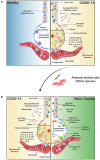Perinatal Cells: A Promising COVID-19 Therapy?
- PMID: 33520970
- PMCID: PMC7841388
- DOI: 10.3389/fbioe.2020.619980
Perinatal Cells: A Promising COVID-19 Therapy?
Abstract
The COVID-19 pandemic has become a priority in the health systems of all nations worldwide. In fact, there are currently no specific drugs or preventive treatments such as vaccines. The numerous therapies available today aim to counteract the symptoms caused by the viral infection that in some subjects can evolve causing acute respiratory distress syndromes (ARDS) with consequent admission to intensive care unit. The exacerbated response of the immune system, through cytokine storm, causes extensive damage to the lung tissue, with the formation of edema, fibrotic tissues and susceptibility to opportunistic infections. The inflammatory picture is also aggravated by disseminated intravascular coagulation which worsens the damage not only to the respiratory system, but also to other organs. In this context, perinatal cells represent a valid strategy thanks to their strong immunomodulatory potential, their safety profile, the ability to reduce fibrosis and stimulate reparative processes. Furthermore, perinatal cells exert antibacterial and antiviral actions. This review therefore provides an overview of the characteristics of perinatal cells with a particular focus on the beneficial effects that they could have in patients with COVID-19, and more specifically for their potential use in the treatment of ARDS and sepsis.
Keywords: PLacental eXpanded; coronavirus-induced disease 2019; mesenchymal stromal cells; perinatal; severe acute respiratory distress syndrome coronavirus-2.
Copyright © 2021 Papait, Cargnoni, Sheleg, Silini, Kunis, Ofir and Parolini.
Conflict of interest statement
MS, GK, and RO are employed by the company Pluristem Ltd. The remaining authors declare that the research was conducted in the absence of any commercial or financial relationships that could be construed as a potential conflict of interest.
Figures


References
-
- Allen H., Shraga-Heled N., Blumenfeld M., Dego-Ashto T., Fuchs-Telem D., Gilert A., et al. (2018). Human placental-derived adherent stromal cells co-induced with TNF-alpha and IFN-gamma inhibit triple-negative breast cancer in nude mouse xenograft models. Sci. Rep. 8:670. 10.1038/s41598-017-18428-1 - DOI - PMC - PubMed
-
- Amari A., Ebtekar M., Moazzeni S. M., Soleimani M., Amirabad L. M., Tahoori M. T., et al. (2015). Investigation of immunomodulatory properties of human Wharton's Jelly-derived mesenchymal stem cells after lentiviral transduction. Cell. Immunol. 293, 59–66. 10.1016/j.cellimm.2014.12.003 - DOI - PubMed
Publication types
LinkOut - more resources
Full Text Sources
Other Literature Sources

